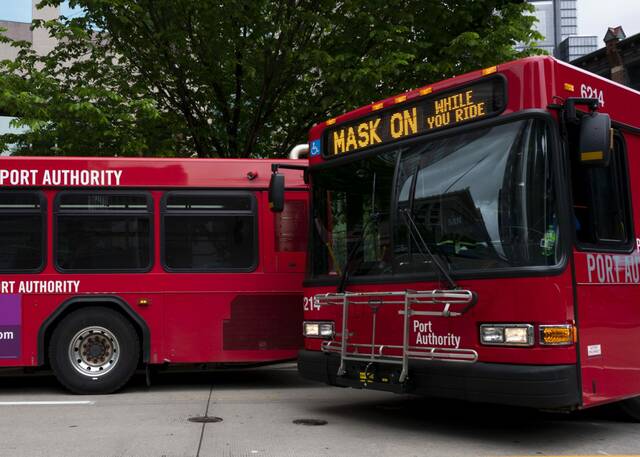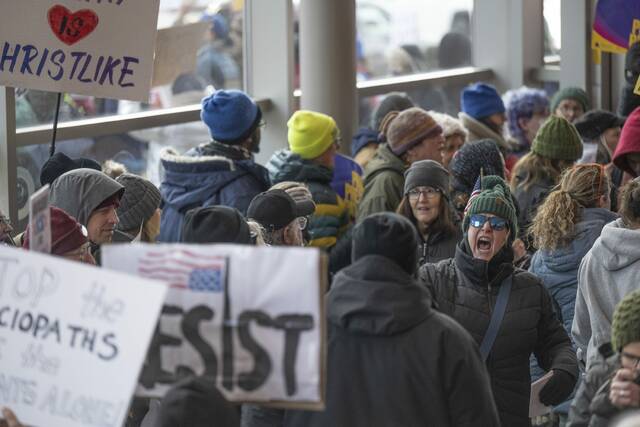The 3rd U.S. Circuit Court of Appeals heard arguments Tuesday in the federal lawsuit over a Port Authority of Allegheny County uniform policy banning Black Lives Matter facemasks and other political speech.
In July 2020, an employee complained about Black Lives Matter facemasks being worn by some bus drivers, prompting a new policy banning “buttons, stickers, jewelry and clothing (including masks or other face coverings) of a political or social protest nature.”
Two months later, following protests among employees and the public, the agency implemented an even more restrictive policy, allowing only four types of masks: one with the Port Authority logo, one with the union logo, a solid blue or black mask, or a surgical N-95 mask.
The Amalgamated Transit Union Local 85 and several employees filed a federal lawsuit against Port Authority, arguing that the uniform policy violated their rights to free speech and equal protection.
U.S. District Judge J. Nicholas Ranjan in January ruled that the ban on political speech was “arbitrary and over broad,” and that Port Authority failed to show that the masks in question caused any disruption among employees or customers.
The ruling prohibited Port Authority from enforcing the mask ban.
The transit agency, which employs about 1,700 drivers, appealed that ruling, arguing that its interest in preventing disruption of operations outweighs employees’ interest in engaging in protest speech while on duty.
A three-judge panel, including Judge D. Michael Fisher, Patty Shwartz and David J. Porter, heard oral argument on Tuesday in Philadelphia.
Greg Krock, who represented Port Authority, said the agency is only trying to regulate speech of employees while in uniform and on the clock.
“This is not an attempt by the government to silence employees’ speech on their own time,” he said.
The intent is to ensure that customers are comfortable and there is no disruption to operations, Krock said. Allowing Black Lives Matter masks to be worn by drivers could cause patrons to be uncomfortable or have reticence to not seek help when they need it. Instead, he said there should be a welcoming environment on Port Authority buses.
Shwartz noted that Port Authority CEO Katharine Kelleman embraced the Black Lives Matter movement both on her own and on behalf of the organization.
“But it’s not OK for the employees to do the same thing?” Shwartz asked.
“We do support it as an organization,” Krock answered. “That’s a message it can control.”
In the past, Port Authority has allowed other political and social speech, including supporting Pride events and showing community support for Stronger than Hate, Shwartz said.
“How do you reconcile this inconsistency of what’s been allowed in the workplace?” she asked.
Krock replied that Port Authority management wasn’t aware that drivers were embracing other political speech.
He said that once Port Authority allows employees to speak on one side of an issue, then they also have to allow the other side to speak.
“What happens when an employee wears a mask with a confederate flag?” Krock asked. “We’ve had employees threaten, ‘I’m going to wear a white lives matter mask.’”
Allowing Black Lives Matters masks forces Port Authority to engage in viewpoint discrimination, Krock said.
“We need to have a workable policy,” he said. “We have a significant right in having an appearance of neutrality.”
Joseph J. Pass, who represented the transit union in oral argument, said more than 50% of Port Authority’s patrons and 48% of its drivers are minorities.
The only comments they received about the Black Lives Matter masks were positive ones, Pass said.
“It will not cause disruption to the operation,” he said.
Pass said public employees should have a right to address issues of public importance.
“It boils down to a free speech issue,” he said.
Citing Krock’s confederate flag example, Pass said, “Black Lives Matter is not causing wars.”
“Summer of 2020 was pretty war-like in some cities,” Porter countered. “Why subject customers to this kind of messaging?”
“There’s always going to be some disagreement,” Pass replied. “What is the value of the speech versus the employer’s right to say it’s going to cause disruption?”
Krock argued there doesn’t have to be actual disruption to Port Authority’s operations to prohibit the speech.
“We had evidence of tension and hostility among employees,” he said. “Port Authority is in an awful position. We may lose employees over this.”








